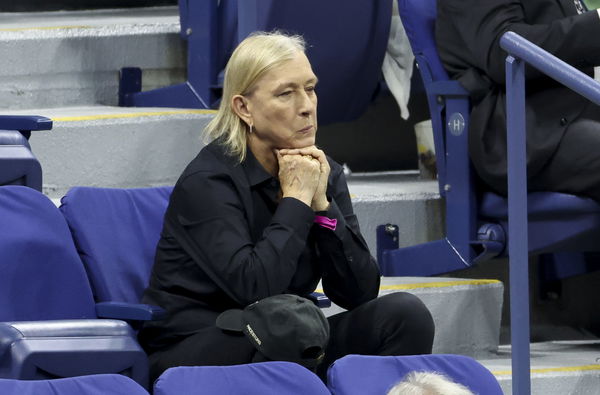
via Imago
NEW YORK, NY – SEPTEMBER 9 : Martina Navratilova attends day 12 of the US Open 2022, 4th Grand Slam of the season, at the USTA Billie Jean King National Tennis Center on September 9, 2022 in Queens, New York City. (Photo by Jean Catuffe/GC Images)

via Imago
NEW YORK, NY – SEPTEMBER 9 : Martina Navratilova attends day 12 of the US Open 2022, 4th Grand Slam of the season, at the USTA Billie Jean King National Tennis Center on September 9, 2022 in Queens, New York City. (Photo by Jean Catuffe/GC Images)
In a recent turn of events, tennis veteran Martina Navratilova put forth an interesting aspect of her life that isn’t spoken about much. Sports and gender association don’t often go hand in hand, and back in her time, the world was far from achieving a broad mindset that it relatively has today. Navratilova faced such a problem firsthand, and she struggled through it when she was at the peak of her career.
Navratilova joined Kara Swisher in the latest episode of her podcast, where she shared the struggles she faced during the heydays of her career.
ADVERTISEMENT
Article continues below this ad
Martina Navratilova and her unseen battle
In the dynamic world of sports and sponsorship, securing lucrative endorsements often defines an athlete’s legacy. Navratilova found herself at the intersection of prowess and prejudice during a pivotal era in her career. The subtleties of her struggle lay hidden behind the glitz of victories and titles. As the ’79 tennis season unfolded, Navratilova’s ascent to the number one ranking set the stage for what should have been a cascade of endorsements. However, the American market, which was a crucial arena for sports endorsements, seemed hesitant to embrace her.
The tennis virtuoso recalled: “So I didn’t really have any deals outside of shoes, rackets, and clothing.” Despite her dominance on the court, the endorsements remained elusive in the United States. Navratilova’s frustration grew as the silence in the Madison Avenue meeting rooms continued.
Navratilova’s agent’s candid revelation about the hushed response in those sessions speaks volumes. Amidst her popularity in Europe and Japan, the American endorsement landscape remained completely indifferent. She said: “You know, you didn’t see any commercials. They didn’t put me on the cover of Wheaties.”
The financial toll of this oversight, as she disclosed, amounted to millions and marked a poignant chapter in Navratilova’s journey. It is the one where success on the court did not seamlessly translate to the acknowledgment of it. However, she continued to rise.
ADVERTISEMENT
Article continues below this ad
Martina Navratilova’s Hall of Fame Journey
In the face of endorsement setbacks and the muted reception in the United States, Martina Navratilova still managed to carve an enduring legacy in tennis. Navigating the complex intersection of sports and gender identity, she persisted, defying the norms of her time. While her struggle for endorsements echoed in the silent corridors of Madison Avenue, Navratilova’s resilience spoke louder on the court.
Martina Navratilova’s indomitable spirit mirrors the trailblazing path of LGBITQA+ icons like Billie Jean King. In an era where acceptance was scarce, Navratilova’s ascent to the Tennis Hall of Fame became a beacon of inspiration. Especially as, similar to Billie Jean King, her public outing in 1981 probably didn’t do much to make her appealing to the American layman at the time, making her a no-no for sponsorships.
ADVERTISEMENT
Article continues below this ad
Navratilova’s journey underscores the rarity of openly LGBITQA+ players in the tennis circuit. It also solidified her place as a champion on the court and a symbol of triumph over adversity. What are your thoughts on Navratilova’s struggles?
WATCH THIS STORY: In Her Latest Heartfelt Gesture, Simone Biles Gives the Toast to Another NFL Wifey on Her Special Day
ADVERTISEMENT
ADVERTISEMENT
ADVERTISEMENT
